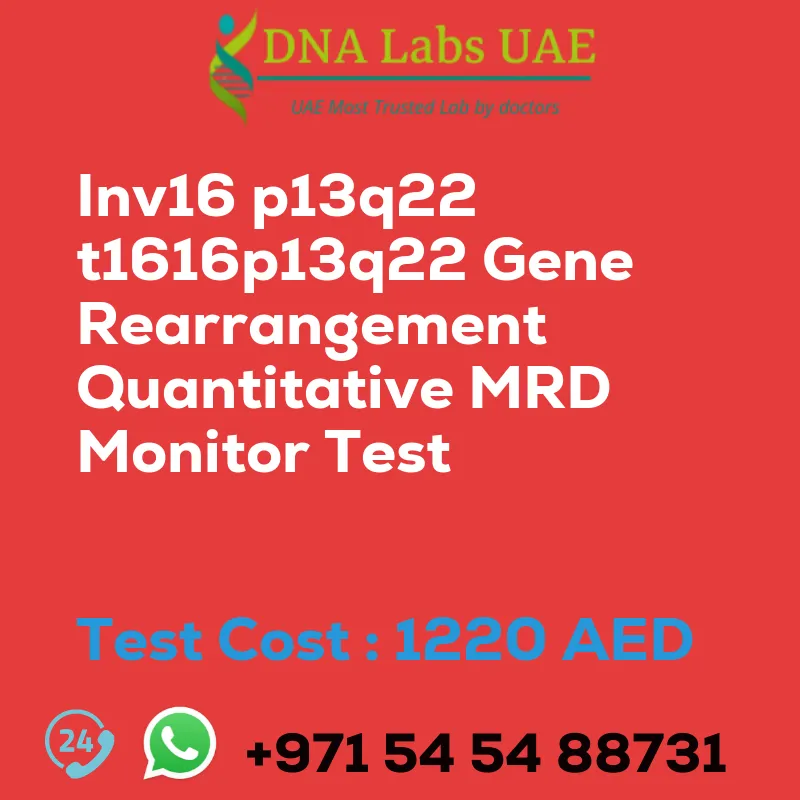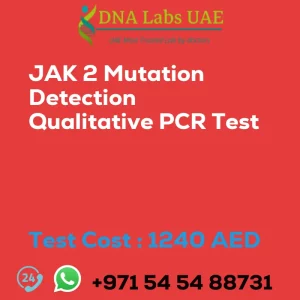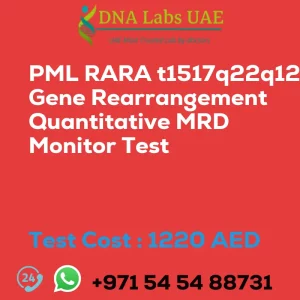Inv16 p13q22 t1616p13q22 GENE REARRANGEMENT QUANTITATIVE MRD MONITOR Test
At DNA Labs UAE, we offer the Inv16 p13q22 t1616p13q22 GENE REARRANGEMENT QUANTITATIVE MRD MONITOR Test. This diagnostic test is designed to monitor minimal residual disease (MRD) in patients with genetic rearrangements involving the Inv16 (p13q22) or t(1616)(p13q22) genes.
Test Details
The Inv16 (p13q22) / t(1616)(p13q22) gene rearrangement quantitative MRD monitor test is a diagnostic test used to monitor minimal residual disease (MRD) in patients with certain genetic rearrangements involving the Inv16 (p13q22) or t(1616)(p13q22) genes. MRD refers to the small number of cancer cells that may remain in a patient’s body after treatment, even when there is no evidence of disease.
Monitoring MRD is important in assessing the effectiveness of treatment and predicting the likelihood of relapse. This specific test is designed to detect and quantify the presence of the Inv16 (p13q22) or t(1616)(p13q22) gene rearrangements in a patient’s bone marrow or blood sample. These gene rearrangements are associated with certain types of leukemia, such as acute myeloid leukemia (AML).
The test utilizes a quantitative polymerase chain reaction (qPCR) technique to amplify and quantify the specific gene rearrangements. By measuring the levels of the rearranged genes, the test can provide information about the extent of MRD in a patient’s body. The results of the test can help healthcare providers determine the appropriate treatment plan for the patient. If the MRD levels remain high, additional treatments or interventions may be necessary to prevent relapse. Conversely, if the MRD levels are low or undetectable, it indicates a good response to treatment and a lower risk of relapse.
It is important to note that this test is specific to the Inv16 (p13q22) or t(1616)(p13q22) gene rearrangements and may not be applicable to other types of genetic rearrangements or cancers. Additionally, the test should be interpreted by a qualified healthcare professional who is familiar with the specific genetic abnormalities and their implications in the context of the patient’s overall condition.
Test Components and Price
The Inv16 p13q22 t1616p13q22 GENE REARRANGEMENT QUANTITATIVE MRD MONITOR Test is priced at 1220.0 AED. The test includes a sample condition of 5 mL (3 mL min.) whole blood / Bone marrow in 1 Lavender Top (EDTA) tube. The sample should be shipped refrigerated and should not be frozen. A duly filled MRD Requisition form (Form 22) with historical data is mandatory for the test.
Report Delivery
The sample for the test should be submitted on Monday or Thursday by 11 am, and the report will be delivered on Wednesday or Saturday.
Method
The Inv16 p13q22 t1616p13q22 GENE REARRANGEMENT QUANTITATIVE MRD MONITOR Test utilizes the Real Time PCR method for accurate results.
Test Type
The test falls under the category of Cancer tests.
Doctor and Test Department
The Inv16 p13q22 t1616p13q22 GENE REARRANGEMENT QUANTITATIVE MRD MONITOR Test is conducted by Oncologists and Hematologists in the Molecular Diagnostics department.
Pre Test Information
A duly filled MRD Requisition form (Form 22) with historical data is mandatory for the test.
| Test Name | Inv16 p13q22 t1616p13q22 GENE REARRANGEMENT QUANTITATIVE MRD MONITOR Test |
|---|---|
| Components | |
| Price | 1220.0 AED |
| Sample Condition | 5 mL (3 mL min.) whole blood \/ Bone marrow in 1 Lavender Top (EDTA) tube. Ship refrigerated. DO NOT FREEZE. Duly filled MRD Requisition form (Form 22) with historical data is mandatory. |
| Report Delivery | SampleMon / Thu by 11 am; Report Wed / Sat |
| Method | Real Time PCR |
| Test type | Cancer |
| Doctor | Oncologist, Hematologist |
| Test Department: | MOLECULAR DIAGNOSTICS |
| Pre Test Information | Duly filled MRD Requisition form (Form 22) with historical data is mandatory. |
| Test Details |
The Inv16 (p13q22) / t(1616)(p13q22) gene rearrangement quantitative MRD monitor test is a diagnostic test used to monitor minimal residual disease (MRD) in patients with certain genetic rearrangements involving the Inv16 (p13q22) or t(1616)(p13q22) genes. MRD refers to the small number of cancer cells that may remain in a patient’s body after treatment, even when there is no evidence of disease. Monitoring MRD is important in assessing the effectiveness of treatment and predicting the likelihood of relapse. This specific test is designed to detect and quantify the presence of the Inv16 (p13q22) or t(1616)(p13q22) gene rearrangements in a patient’s bone marrow or blood sample. These gene rearrangements are associated with certain types of leukemia, such as acute myeloid leukemia (AML). The test utilizes a quantitative polymerase chain reaction (qPCR) technique to amplify and quantify the specific gene rearrangements. By measuring the levels of the rearranged genes, the test can provide information about the extent of MRD in a patient’s body. The results of the test can help healthcare providers determine the appropriate treatment plan for the patient. If the MRD levels remain high, additional treatments or interventions may be necessary to prevent relapse. Conversely, if the MRD levels are low or undetectable, it indicates a good response to treatment and a lower risk of relapse. It is important to note that this test is specific to the Inv16 (p13q22) or t(1616)(p13q22) gene rearrangements and may not be applicable to other types of genetic rearrangements or cancers. Additionally, the test should be interpreted by a qualified healthcare professional who is familiar with the specific genetic abnormalities and their implications in the context of the patient’s overall condition. |








